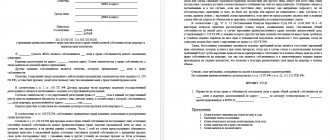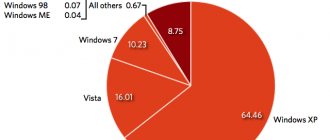Home » Housing disputes » Allocation of a share in kind of non-residential premises from common shared property
1
There are often situations when a property is purchased, or inherited, or received as a gift by several owners at the same time. Most often, in these cases, co-owners register the property as shared ownership: equally between all owners or in proportion to the contribution of each of them to the purchase of real estate.
Allocation of shares: where to start
2
In cases where real estate is acquired by several co-owners or received as an inheritance by two or more heirs, all owners are entitled to their own share in such premises.
The same situation arises when the owner sells a commercial building in parts. The owners of such parts have the right to independently or jointly apply for the allocation of their share in kind.
The law establishes a specific mandatory procedure for allocating your part of the property.
Basic Concepts
To divide non-residential real estate into parts, a legislative division of one object into several separate premises is provided. Each of them must receive its own cadastral number, as well as separate title documentation:
- certificate of ownership;
- technical certificate;
- cadastral passport.
The legislation of the Russian Federation does not establish limits on the number of individual parts in non-residential real estate. This means that in the future the owner of such premises can dispose of it as he sees fit.
In this case, the regime for the operation of premises in non-residential real estate must be established by concluding a special agreement “on joint use” by all co-owners.
Such an agreement must contain the following mandatory clauses:
- An indication that the operation of the premises should not limit the rights of other participants to own and use their share.
- List of areas in common use (warehouses, utility rooms, corridors, stairs, toilets).
Infringement by some owners of the right of others to use the common territory is illegal.
The relationship, as well as the legal status of co-owners of property, regardless of its form (residential or non-residential space), is regulated by Chapter 16 of the civil legislation of Russia.
Thus, norm 247 of the Civil Code of the Russian Federation spells out the principles of regulation and establishment of lawful exploitation of real estate shared property. In particular, this rule states that the owner has the right to demand the transfer of part of the property to him in proportion to the share he has by right of ownership.
Before starting the procedure for allocating a natural share in a non-residential premises or building, the owner must comply with the following mandatory conditions:
- as a result of the allocation, other participants should not suffer;
- the architectural features of the structure are taken into account (the possibility of separating the area from other premises);
- the size of the share in square meters is taken into account (necessary to establish the possibility of allocation);
- as a result of the procedure, the rest of the building should function as usual;
- it is necessary to obtain permission from the remaining co-owners for the allocation, and obtain consent in the form of a written document.
Methods for dividing property and separating shares from it are regulated by norm 252 of the Civil Code of the Russian Federation. In accordance with this article, the allocation may occur:
- By concluding a voluntary agreement - possible in the absence of contradictions, claims and conflicts between share owners.
- By involving the judiciary - in cases where there are disagreements and disputes between the co-owners regarding the division of the premises into parts, any of them can go to court.
In cases where there is no protest from other co-owners of commercial real estate, the participants in shared ownership may enter into an agreement allowing the allocation of specific property shares.
The document is drawn up in writing. To draw up and sign a mutual consent, it is necessary to use the services of a notary office, since the document must be certified.
When starting to draw up an agreement, you need to indicate the following points:
- information about the parties (indication of the details of all co-owners);
- date of signing and place;
- location of the building (exact address);
- its constituent parts (number of premises);
- functional premises (warehouses, utility rooms);
- area of the entire building (determined in square meters), number of storeys;
- shares (size in m2) of each co-owner;
- plan (diagram) of the building (indicating the allocated premises);
- title documentation (purchase agreement, inheritance certificate, privatization documents);
- real estate document;
- indication (if any) and conditions for the use of easements - the possibility of using someone else’s territory (for example, accessing your premises through a neighbor’s);
- signatures of all co-owners.
Upon completion of registration, each owner receives his or her original document. A co-owner who wishes to allocate his share must contact the state cadastral registration service (Rosreestr) with his original agreement.
A certificate of ownership for the allocated premises can be obtained after paying the state fee (for citizens - 2,000 rubles; for legal entities - 22,000) after 10 days.
Judicial order
If the co-owners were unable to reach a consensus on the issue of natural allocation of shares, the only way to carry out the division is to appeal to the judicial authorities.
Cases on the allocation of a part in shared real estate can be considered by courts of two instances:
- Magistrates' Court - to apply, the amount of the claim must be less than or equal to 50 thousand rubles.
- General jurisdiction (district court) – cases with claims exceeding 50 thousand rubles.
Information to be provided when filing a claim:
- information about the parties to the process;
- name and address of the court;
- indication of the type of application (about the allocation of a share);
- description of the essence of the case under consideration (the reasons why joint exploitation became impossible);
- indication of information about the agreement (were there any proposals for conclusion);
- building plan and proposed method of dividing the premises (separate entrance, erection of walls);
- information about witnesses (if any);
- petition to the court;
- a list of attached documents;
- date and signature.
To prove an attempt to enter into a voluntary agreement, the plaintiff must send registered letters with return receipt requested to the other owners.
In addition, along with the application, the following documentation necessary for consideration should be submitted to the court:
- papers indicating ownership;
- documents for the share;
- a copy of the technical passport from the BTI;
- check for payment of state duty (calculated based on the cost of the claims).
- Consideration of property claims. Based on the provisions of the Code of Civil Procedure of the Russian Federation, the application must be considered within two months. The only exceptions are complex situations that require the involvement of third-party experts, witnesses, and other procedural actions within the framework of the trial.
- Issuance of a judicial act. If there is no appeal, it comes into force after ten days.
- Receive a copy of the decision. This document must be submitted to the property rights registration authorities.
The following is the standard procedure for registering the right to property in Rosreestr.
The statement of claim sent to the appropriate court must be accepted by the judge for consideration (or left without it) within a period not exceeding 5 days. And the decision is usually made no later than 2 months after filing the claim.
However, in exceptional cases, when the court cannot make a decision within the specified time frame due to the complexity of the case, the proceedings may drag on not only for several months, but also for several years.
That is why participation in court hearings, as well as in preparing qualified lawyers for them, is a necessity.
State duty
When filing a claim in court, you must pay a mandatory tax fee - state duty. If the plaintiff is an individual, then you will have to provide a receipt for 300 rubles, but if a legal entity - 2000 rubles.
We invite you to read: Advance agreement when purchasing an apartment
You can find out the details for paying the fee in the court office or on its official website. There you can also issue the receipt itself.
By using the services of specialists on our website, you can find out for free about the best course of action in your particular case.
It is worth remembering that only an experienced lawyer will be able to draw up a legally competent and correct statement of claim for the allocation of a share. In addition, he will also be able to collect all the necessary documents, represent your interests in court and enforce the court decision.
Dividing a structure, building or premises into separate parts is in some cases considered impossible.
Reasons for refusal are:
- architectural properties of the building (excretion can damage the structure of the building, for example, load-bearing walls need to be demolished);
- the share of ownership is insignificant (it is inappropriate to allocate a room that is too small);
- the owner of the allocated part has no interest in the joint exploitation of the property.
In situations where, for any of the above reasons, division is not possible or impractical, the co-owners can pay the owner of the allocated part of the property compensation commensurate with the share. If the owner refuses compensation, compensation is paid by decision of the judicial authorities, after which the owner of the share loses his rights to it.
Arbitrage practice
Disputes regarding the allocation of a share in non-residential premises are quite complex. That is why the courts need to present as much evidence as possible of the need for division of joint property. The most common situations are when one of the co-owners does not want to allocate a share. In this case, the court usually does not side with the plaintiff.
There is a private dental clinic in the shared ownership of citizens O. and L. At the same time, O. owns 4/7 shares in the premises, and L. 3/7. Citizen O. filed a lawsuit against L. for the allocation of 3/7 of the shared ownership and the real division of non-residential premises.
Having considered the dispute, the court decided to refuse O.’s request, citing the fact that the defendant did not demand the allocation of a part, and the forced allocation of the share of one of the participants in common shared ownership is not provided for by law.
In accordance with Part 2 of Article 252 of the Civil Code, division of property into parts is possible only at the request of the owner. Accordingly, the plaintiff has no grounds for demanding the allocation of the defendant's share.
- Due to constant changes in legislation, regulations and judicial practice, sometimes we do not have time to update the information on the site
- In 90% of cases, your legal problem is individual, so independent protection of rights and basic options for resolving the situation may often not be suitable and will only lead to a more complicated process!
- Common shared ownership of non-residential premises can become a stumbling block when selling or exchanging.
- Are you in a similar position?
- How to allocate a share in kind in order to resolve further conflicts between co-owners of non-residential real estate?
How is the regime for using property in shared ownership established?
If we talk about the rules for the operation of such property, then it should be noted that the mode of use is established and agreed upon in the agreement on joint use. In such an agreement, a mandatory clause states that the use of his share by one owner cannot limit the rights of the owners of other shares located in this premises.
The agreement also stipulates that common property, such as stairs, corridors, etc., is in shared ownership. must be used by all owners, regardless of the size of their shares, and restrictions created by some owners in relation to others are considered illegal.
The nuances of signing a division agreement in kind
If it is impossible to divide the property into parts isolated from each other (for example, if a one-room apartment is in collective ownership), the co-owners agree on monetary compensation. Before submitting to the MFC and Rosreestr, documents on the delineation of real estate in kind must be certified by a notary in the presence of all co-owners.
2
Basic Concepts
If you want to find out how to solve your particular problem, just call, it’s fast and free!
7
just click to call
To dispose of your share of commercial real estate means to sell, rent, donate, transfer into gratuitous possession, or otherwise. Without the consent of the owners of other shares, none of these actions can be carried out - that is the law.
Attention ! In paragraph 1 of Art. 246 of the Civil Code of the Russian Federation establishes that the owner has the right to dispose of his share only with the consent of the remaining co-owners, no matter how many there are.
Article 246. Disposal of property in shared ownership Clause 1
The disposal of property in shared ownership is carried out by agreement of all its participants.
Even if the part of the non-residential premises owned by one of the co-owners makes up the lion’s share of the non-residential premises, this does not give him the status of the main owner, and obtaining the approval of the one who owns at least 1/100 of the share is a mandatory condition.
As for the division of expenses for the maintenance of non-residential premises, in accordance with Art. 249 of the Civil Code of the Russian Federation, each owner is obliged to pay in proportion to his share.
Article 249. Expenses for the maintenance of property in shared ownership
Income from commercial real estate owned in different shares or in equal shares can also be divided according to the parts owned by the co-owners.
But in Art. 248 of the Civil Code of the Russian Federation stipulates the possibility of a different distribution of profits if a written agreement is drawn up between the owners.
Article 248. Fruits, products and income from the use of property in shared ownership
Fruits, products and income from the use of property in shared ownership enter the common property and are distributed among the participants in shared ownership in proportion to their shares, unless otherwise provided by an agreement between them.
Failure to negotiate can deprive the co-owner of the opportunity to benefit from his share, which is especially offensive when the non-residential premises have a commercial purpose and belong to popular areas and are located in a good location. There is an option for dividing non-residential premises through the court.
Selling your part
Approximately 1.5 months before the sale of his part of non-residential real estate, its owner is obliged to send written notices to the remaining co-owners of his intention and indicate under what conditions and for what amount the sale is planned.
Important! This is required by Art. 250 of the Civil Code of the Russian Federation: co-owners are given the pre-emptive right to acquire part of the non-residential premises, and in clause 2 of Art. 250 it is indicated that they have a month to respond and express their desire to buy out the share being sold.
To prevent this requirement of the law from being considered violated, you should send your letter by registered mail with a list of the contents and a return receipt, otherwise clause 3 of Art. 250 of the Civil Code of the Russian Federation - the transaction is declared invalid on the basis of a violation of the pre-emptive right to acquire a share.
If non-residential premises were purchased during the marriage of the co-owner who intended to sell his share, then it is necessary for the spouse to notarize consent to the sale of jointly acquired property.
Next, the procedure for selling shared ownership in non-residential premises is as follows:
- order an independent (market) expert assessment of the real estate share.
- Finally decide with the buyer on the amount and terms of the transaction.
- Draw up a preliminary purchase and sale agreement if the buyer does not have the full amount and needs to obtain funds in full.
- Draw up an act of transfer of a share of non-residential premises.
- Sign the deposit agreement and receive it.
- Upon expiration of the period specified in the preliminary agreement, draw up a final purchase and sale agreement and make a full payment.
- Register the purchase and sale agreement.
- With documents for the share of non-residential real estate and with the new owner, go to the Unified State Register of Real Estate to re-register ownership.
Reference ! A market assessment by specialists will help you determine how close the exhibited value is to the real one.
We remind you that you can get a quick free consultation by phone
The purchase and sale agreement for a share of non-residential real estate must contain the following information:
- place of transaction, date;
- information about the parties - individuals: full name, passport details;
- detailed information about the subject of the transaction - area, on which floor it is located, how many floors in the building, intended purpose, exact address, cadastral number, all the main characteristics of the share of the premises;
- cost, both full and price per 1m2 (in Russian rubles);
- payment method and schedule if money is not transferred at a time;
- liability of the parties for failure to comply with the terms of the agreement;
- list of attached documents;
- signatures of the parties with full name decryption.
The drafting of a share purchase and sale agreement should be approached very responsibly. Notarization of this document is not required.
If the last condition is not met, the owners will not have the opportunity to dispose of their property in any way. The legislation of the Russian Federation does not approve a sample agreement on the allocation of a share in kind.
We invite you to familiarize yourself with: Employment contract with an individual (sample)
Therefore, it can be drawn up in any way, with mandatory consideration of all legally significant points. A sample of such an agreement (contract) is given below.
It is recommended that you first seek advice from a competent lawyer in order to handle this case with the greatest benefit, since this is one of the most difficult tasks to accomplish in practice. There are many restrictions for it that you definitely need to know.
The same article provides for the right of the allotted owner to have the value of his share paid to him by other participants if an equivalent allotment in kind is not possible.
The Civil Code of the Russian Federation regulates general issues of division of property of joint property; when concluding an agreement, it is also necessary to take into account the provisions of other legislative acts regulating private relations regarding individual items of division.
For example, in the case of an allotment in a residential building, it is necessary to take into account the principles of the Housing Code of the Russian Federation; when dividing a land plot, the norms of the law “On the Turnover of Agricultural Land” must be taken into account.
Note! The agreement (contract) must be certified by a notary office. The allocation of a share must certainly be registered with the Office of the Federal State Registration Service.
Extrajudicial allocation: agreement on the allocation of shares from joint and shared property Allocation of unregistered property from common shared property Notarial obligation on the allocation of shares: sample Allocation in kind in court Allocation out of court: agreement on the allocation of shares from joint and shared property Joint ownership involves ownership of property without allocation of shares.
The allocation of shares from common joint property occurs in the same order as from common shared property, if the object is divided in kind. The only difference is that in the case of joint ownership, it is necessary to first determine the size of the shares of the co-owners. The owner’s right to allocate a share from the common shared property is enshrined in Art. 252 of the Civil Code of the Russian Federation.
With the help of a document such as an agreement on the allocation of a share in property rights, it is possible to achieve a real division of property. This article will focus on property that is in shared ownership (based on Art.
252 of the Civil Code of the Russian Federation): when the shares in the right to it have already been determined - when purchasing housing, land and other objects (specified in the purchase and sale agreement), donation (in the corresponding agreement), as well as in the agreement on determining shares in the general property.
The most important thing in preparing for the allocation of a share in property rights and the signing of an agreement is to reach an agreement between the participants. About how to actually allocate a part of the property that corresponds to the size of the share.
The nuances of the agreement and methods for allocating a share in property rights will be discussed below; details can be clarified with the duty lawyer.
In order to terminate the right of common shared ownership of the Premises, the Parties agreed to make a real allocation in kind of the Parties' shares in the right of common shared ownership of the Premises in the form of separate functional premises as follows: 2.
1. Party 1 is given ownership of the following functional premises: 2.1.1. Functional premises No., located on the second floor of the Building, with a total area of sq.m. 2.1.2. Functional room No., total area sq.m. 2.2.
Party 2 is given ownership of the following functional premises: 2.2.1. Functional premises No., located on the second floor of the Building, with a total area of sq.m. There are no claims between the parties. 3.
Ownership of individual functional premises specified in paragraphs 2.1.1., 2.1.2., 2.2.1.
The allocation of a share in kind cannot be carried out in the following cases:
- allocation of a share is unrealistic due to the architectural features of the property in question;
- the size of the share in the common property is insignificant;
- the owner of the allocated share has no interest in the property being used jointly.
In all other cases, if such an event does not interfere with the full use of non-residential premises by other co-owners, the allocation of a share will be possible, but only if an appropriate court decision is made. How is the part selected? Here we will talk about the procedure for using non-residential real estate. The allocation of a part of non-residential premises for natural possession is carried out by issuing an appropriate court decision.
Conditions for allocating a share in kind
The allocation of a share in kind is possible only if the following conditions are met:
- The allocated share should not interfere with other co-owners or in any way infringe on their rights.
- When actually allocating a share, it is necessary to equip a separate entrance, separate from other parts of the non-residential premises.
- Compliance with the minimum permissible share size is mandatory.
- Violation of the architectural appearance of a non-residential building, as well as the normal functioning of its parts, is not allowed.
- In order to make an allotment, the consent of all co-owners or a court decision is required.
Housing problem: solutions
Registration of separate ownership of residential space in apartment buildings occurs in two options: they continue to own the property jointly or with subsequent redevelopment of the housing. In case of joint ownership, the co-owners stipulate in the agreement the rules for maintaining the common property, paying for utilities by contribution, and taxes each for himself.
The redevelopment is carried out in such a way that co-owners can use the property without interfering with each other. According to legal standards, such redevelopment means the arrangement of separate entrances, the presence in each part of the divided housing of at least one room, kitchen, bathroom and bathroom, as well as the installation of separate meters for electricity and water consumption.
Attachments to the claim
Art. 132 of the Code of Civil Procedure of the Russian Federation determines the list of documents that must be attached to the statement of claim.
- A copy of the claim. The number of copies depends on the number of participants in the process - everyone must receive their own and 1 copy for the judge.
- Applicant's identity card. A civil passport, residence permit, or other document identifying the plaintiff will be suitable.
- Technical passport for the apartment.
- Documents on the basis of which the plaintiff acquired ownership of a share in the apartment.
- Information about payment of the state fee, the amount of which depends on the cost of the claim.
- Other documents related to the case.
Important! In some cases, the plaintiff cannot independently obtain any documents. The law allows you to attach to the claim a petition for the court to request the necessary document from the relevant authority. Consult with a lawyer about how to properly draft your petition.
During the court hearing, the judge may oblige any of the participants in the process to provide certain information and documents.
What do you mean by part?
Shared ownership of non-residential premises is generally considered to be a form of ownership and management of a real estate fund in which such property will have two (or more) actual owners who have equal rights to each other regarding a specific property.
This form of ownership can arise for various reasons, which must be reflected when drawing up the appropriate documents confirming existing property rights.
The most common reason for the emergence of shared ownership, regardless of which premises it is registered for, will be considered:
- making a joint purchase by several future co-owners of real estate with the payment of a proportionate payment for the purpose of subsequent allocation of shares for ownership and disposal;
- privatization of a previously unregistered state or municipal property belonging to the residential or non-residential real estate fund;
- receiving shares in real estate in accordance with the will specified in the will after the death of the testator.
Much less common is the basis for the emergence of shared ownership as the sale by the owner of the entire premises of some part of it to another owner.
Most often, this form of shared ownership occurs when forming a list of owners of non-residential premises located in various shopping or office centers, when the owner of the building sells parts of it (offices, offices, space for boutiques) to interested parties.
In connection with such possibilities for the emergence of shared ownership, the mode of use of property in such ownership must be determined in such a manner that none of the co-owners will limit the rights of other similar persons.
Land plot: expert recommendations
It is necessary to transfer part of a single plot of land into separate ownership with the notarized consent of all persons having rights to the land. After the agreement is concluded, land surveying is carried out and each new plot receives its own plan and number, and is also registered in the cadastral register. For all newly formed land plots, a separate extract from the Unified State Register is obtained.
You can download the document for allocating a share in the land here.
Expenses
The main costs associated with the trial can be divided into 3 groups.
- Legal expenses. This group includes the participation of a lawyer in the process, preparing a claim, representation in court, requesting documents, etc.
- Administrative expenses. Costs for obtaining documents, drawing up a technical plan, etc.
- Payment of state duty.
The amount of the duty is determined by Art. 333.19 of the Tax Code of the Russian Federation and is calculated based on the cost of the claim.
We suggest you read: Do children pay property taxes?
| Cost of claim, rub. | Fixed part, rub. | Percentage of the claim price |
| Up to 20,000 | — | 4%, but not less than 400 rubles. |
| 20 001 – 100 000 | 800 | 3% |
| 100 001 – 200 000 | 3 200 | 2% |
| 200 001 – 1 000 000 | 5 200 | 1% |
| 1,000,001 or more | 13 200 | 0.5%, but not more than 60,000 rubles. |
Maternity capital: how to allocate a share to children
When purchasing a home with a mortgage, it is necessary to allocate part of the living space to minor children (when using maternity capital). The agreement is signed by the parents, but is notarized. The property remains in common ownership. The size of the shares is determined based on the amount of maternity capital spent on housing, but it is taken into account that the size of living space for each family member cannot be less than the standard established by law (from 6 sq.m. to 12 sq.m., depending on the region ). Detailed instructions can be found here.
What matters when allocating a share in non-residential premises?
If it is impossible to allocate a part of the property for some reason, it is necessary to conduct an appraisal examination to determine the value of such a share. With the expert opinion, you must contact other owners for compensation. When it is not possible to reach an agreement, you will have to file a claim in court. The application indicates the cadastral number of the premises, the presence of persons interested in its use, information about the right that has arisen and other information.
Confirmation of the fact of shared ownership must be attached to the list of documents. When going to court, you will need to make copies of all documents, having them certified by a notary. If you don’t know how to get around some of the difficulties, the procedure will take a long time. We will carry it out twice as fast, solving any problem without trial. If you need to file a claim, our lawyers will represent your interests by proxy. We guarantee the legal conduct of the share allocation procedure and an invariably positive result.
Procedure for going to court
Choice of court
Cases on the allocation of a share in an apartment fall under the jurisdiction of district (equivalent to them city and interdistrict) courts. The claim must be filed in the court that serves the area where the disputed property is located. This requirement is specified in Art. 30 Code of Civil Procedure of the Russian Federation.
How to file a claim for allocation of a share in an apartment in kind
The statement of claim is submitted to the court in one of 3 ways.
- In person, to the court office. The plaintiff brings the claim and its attachments and submits it to the secretary for signature.
- Through a representative. The authorized person must have a notarized power of attorney to perform such actions.
- By mail. The claim and its attachments are sent to the court office by a valuable letter with a list of attachments and a notification of delivery.
The received claim is checked by the secretary for compliance with legal requirements. If no violations are found, the court employee registers the application and puts a receipt mark on the plaintiff’s copy.
Important! The statement of claim is submitted in the number of copies according to the number of participants in the process.
Conclusion
- choose the judicial body to which the claim will be sent;
- legally competently justify the legality of your claims and the need to allocate a share;
- correctly indicate the provisions of the law that support his position;
- decide which documents will be applicable in his situation.
If the requirements of the Code of Civil Procedure of the Russian Federation are violated, the judge will return the claim or leave it without progress.
Due to frequent updates to legislation and the legal uniqueness of each situation, we recommend obtaining a free telephone consultation with a lawyer. You can ask your question using the hotline number or write it in the form below.
Arbitrage practice
The main disputes regarding the allocation of a share in kind of non-residential premises are disputes between entrepreneurs. Often their views on doing business differ, and they are forced to resolve disputes in court. The overwhelming majority of cases end in the award of compensation.
Cases of refusal to allocate a share in kind and its replacement with monetary compensation:
- if it is impossible to allocate a share in the form of an autonomous non-residential area;
- if the size of the share is so small that it cannot be separated (clause 4 of Article 252 of the Civil Code of the Russian Federation);
- if the co-owner of the share does not want to use the share jointly with other entrepreneurs.
Example: Fadeev and Kunitsyn shared ownership of a tattoo parlor. At first, the common business went well, but then the partners began to fall into quarrels. After one of these quarrels, Fadeev firmly decided to get rid of his share in the common property. He sent a registered letter notifying Kunitsyn of the sale of his share. There was no return response, although Fadeev received notification that his partner had signed for the delivery of the letter. Having decided that Kunitsyn did not want to buy out his share, Fadeev found a third-party buyer and sold the share to him. However, six months later, Kunitsyn filed a lawsuit to transfer the rights of the buyer of Fadeev’s share to himself. The basis was stated in paragraph 3 of Art. 250 of the Civil Code of the Russian Federation on the pre-emptive right to purchase. The court demanded clarification from Fadeev, since there were all the facts of violation of the interests of his business partner. Fadeev, in turn, provided a copy of the notification of sending a registered letter, as well as information about the absence of a return response from Kunitsyn within 30 days. Based on the evidence, the court found that Fadeev acted within the framework of the law, did not violate the pre-emptive right of purchase, and therefore sold his share legally.
It is a mistake to think that a solution algorithm is suitable for all situations. Even if they are identical, there will definitely be small nuances that will change the order of actions or require additional steps. The main difficulty is to come to an agreement with the co-owners. It is logical that everyone will try to pull the blanket over themselves and interfere with others. Hence the problems with allocating a share or dividing a commercial premises in common shared ownership. It happens that co-owners make wrong decisions, as a result of which the entire further process suffers. In order not to overpay for examinations, contracts, assessments and other actions, it is better to seek help from lawyers. If you have a difficult situation, you cannot solve it alone. But the lawyer will suggest the correct course of action, adjust the agreement, purchase and sale agreement, or help prepare for the trial. Legal knowledge is never superfluous. And in the case of non-residential properties and businesses, they are vital!
Watch a video about the division of commercial premises between co-owners:
Attention!
- Due to frequent changes in legislation, information sometimes becomes outdated faster than we can update it on the website.
- All cases are very individual and depend on many factors. Basic information does not guarantee a solution to your specific problems.
That's why FREE expert consultants work for you around the clock!
- via the form (below), or via online chat
- Call the hotline:
- Moscow and the Region
- St. Petersburg and region
- FREE for a lawyer!
By submitting data you agree to the Consent to PD Processing, PD Processing Policy and User Agreement.
Anonymously
Information about you will not be disclosed
Fast
Fill out the form and a lawyer will contact you within 5 minutes
Tell your friends
Rate ( 3 ratings, average: 5.00 out of 5)
Author of the article
Maxim Privalov
Lawyer. 2 years of experience. I specialize in civil disputes in the field of housing and family law.
Author's rating
Articles written
610











